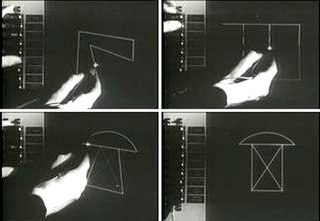
Sketchpad is a computer program written by Ivan Sutherland in 1963 in the course of his PhD thesis, for which he received the Turing Award in 1988, and the Kyoto Prize in 2012. It pioneered human–computer interaction (HCI), and is considered the ancestor of modern computer-aided design (CAD) programs as well as a major breakthrough in the development of computer graphics in general. For example, the graphical user interface (GUI) was derived from Sketchpad as well as modern object-oriented programming. Using the program, Ivan Sutherland showed that computer graphics could be used for both artistic and technical purposes in addition to demonstrating a novel method of human–computer interaction.
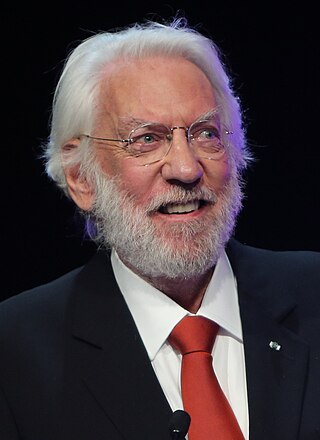
Donald McNichol Sutherland is a Canadian actor whose film career spans over six decades. He has been nominated for nine Golden Globe Awards, winning two for his performances in the television films Citizen X (1995) and Path to War (2002); the former also earned him a Primetime Emmy Award. An inductee of the Hollywood Walk of Fame and Canadian Walk of Fame, he also received a Canadian Academy Award for the drama film Threshold (1981). Multiple film critics and media outlets have cited him as one of the best actors never to have received an Academy Award nomination. In 2017, he received an Academy Honorary Award for his contributions to cinema. In 2021, he won the Critics' Choice Television Award for Best Supporting Actor in a Movie/Miniseries for his work in the HBO miniseries The Undoing (2020).
This article contains information about the literary events and publications of 1906.

Kiefer William Sutherland is a British-Canadian actor and musician. He is best known for his starring role as Jack Bauer in the Fox drama series 24, for which he won an Emmy Award, a Golden Globe Award, two Screen Actors Guild Awards, and two Satellite Awards.
John Andrew Sutherland is a British academic, newspaper columnist and author. He is Emeritus Lord Northcliffe Professor of Modern English Literature at University College London.

Robert Hichens was a British sailor who was part of the deck crew on board the RMS Titanic when she sank on her maiden voyage on 15 April 1912. He was one of seven quartermasters on board the vessel and was at the ship's wheel when the Titanic struck the iceberg. He was in charge of Lifeboat #6, where he refused to return to rescue people from the water according to several accounts of those on the boat, including Margaret Brown, who argued with him throughout the early morning. In 1906, he married Florence Mortimore in Devon, England; when he registered for duty aboard the Titanic, his listed address was in Southampton, where he lived with his wife and two children.

Frederick Fleet was a British sailor, crewman and a survivor of the sinking of the RMS Titanic. Fleet, along with fellow lookout Reginald Lee, was on duty when the ship struck the iceberg; Fleet first sighted the iceberg, ringing the bridge to proclaim: "Iceberg, right ahead!" Both Fleet and Lee survived the sinking.

Lieutenant Colonel Arthur Godfrey Peuchen was a Canadian businessman and RMS Titanic survivor.
Hitchens is a surname of early medieval English origin. Notable people with the surname include:
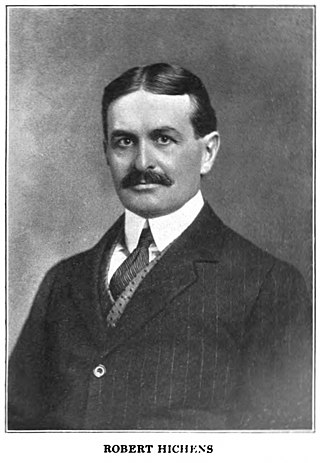
Robert Hichens was an English journalist, novelist, music lyricist, short story writer, music critic and collaborated on successful plays. He is best remembered as a satirist of the "Naughty Nineties".
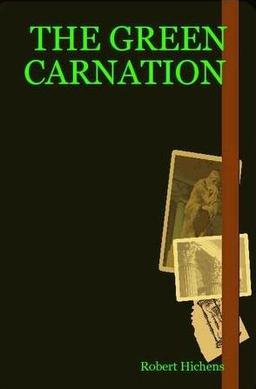
The Green Carnation is a novel by Robert Hichens that was first published anonymously in 1894. A satire on contemporary champions of the Aesthetic Movement, it was withdrawn briefly after the scandal of the Oscar Wilde trial in the following year. Later printings followed and it has remained popular for its depiction of the witty personalities of the time.
The 1928 Rose Bowl Game was a match between Stanford (7–2–1) and the Pittsburgh Panthers (8–0–1). Usually, the Rose Bowl was played on January 1, but in 1928, that fell on a Sunday, so the game was played on January 2, 1928. At this time, the Rose Bowl was the top and only bowl game, an east-vs.-west matchup. Stanford won the game, 7–6.
Robert Hichens may refer to:
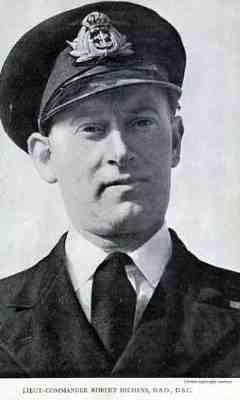
Lieutenant Commander Robert Peverell Hichens, was the most highly decorated officer of the Royal Navy Volunteer Reserve (RNVR), being awarded two Distinguished Service Orders, three Distinguished Service Crosses and three Mentions in Despatches. He was also recommended for a Victoria Cross after being killed in action in April 1943.

The Manchester Man is a novel by the British writer Isabella Banks. It was first published in three volumes in 1876 under her married name, Mrs G. Linnæus Banks. The story follows the life of a Manchester resident, Jabez Clegg, during the nineteenth century and his rise to prosperity in the booming industrial city. It depicts a number of real historical events such as the Peterloo Massacre.

Barbary Sheep is a 1917 American silent drama film produced by Famous Players-Lasky and distributed through Artcraft Pictures, an affiliate of Paramount Pictures. The film was directed by Maurice Tourneur and stars Elsie Ferguson in her motion picture debut. This picture is said to have George M. Cohan in his film debut as well. It is an adaptation of the 1907 novel Barbary Sheep by British writer Robert Hichens. It was thought to be a lost film until an 8-minute clip or fragment was found in the Gosfilmfond archive.

The Iron Sheriff is a 1957 American Western film starring Sterling Hayden.
Per Richard "Dick" Hichens-Bergström was a Swedish diplomat.
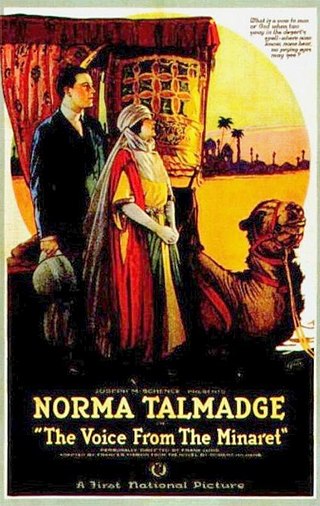
The Voice from the Minaret is a 1923 American silent romantic drama film directed by Frank Lloyd and starring Norma Talmadge, Eugene O'Brien, and Winter Hall. The film is based on the play of the same name by Robert Smythe Hichens. The film is considered lost.

The Bracelet is a 1930 novel by the British writer Robert Hichens. A society scandal breaks over a bracelet given by a man to a woman, leading to a court case.














